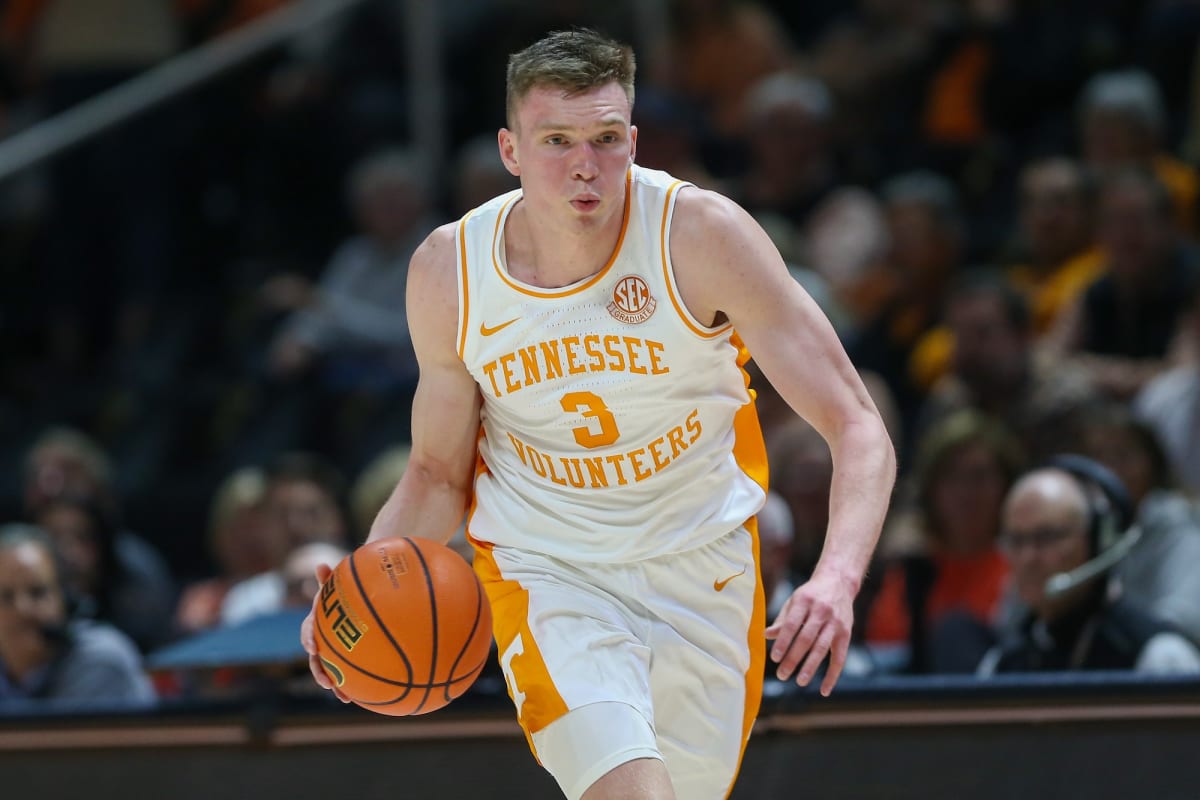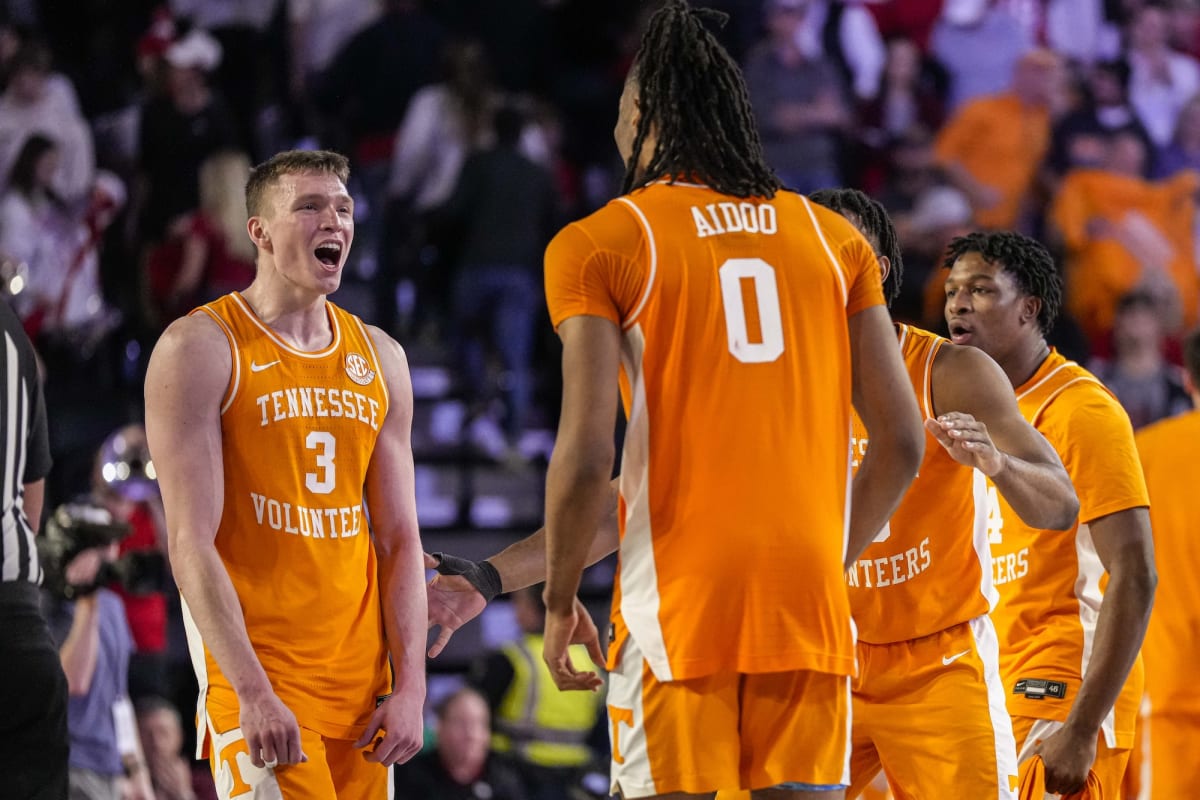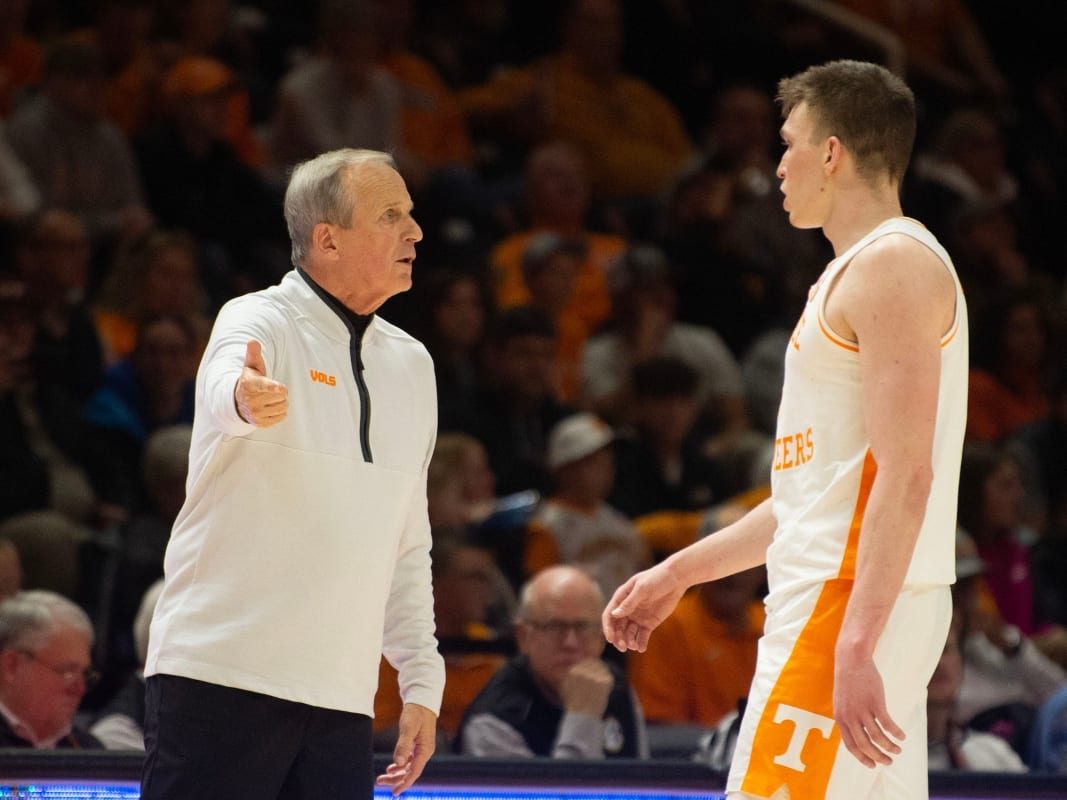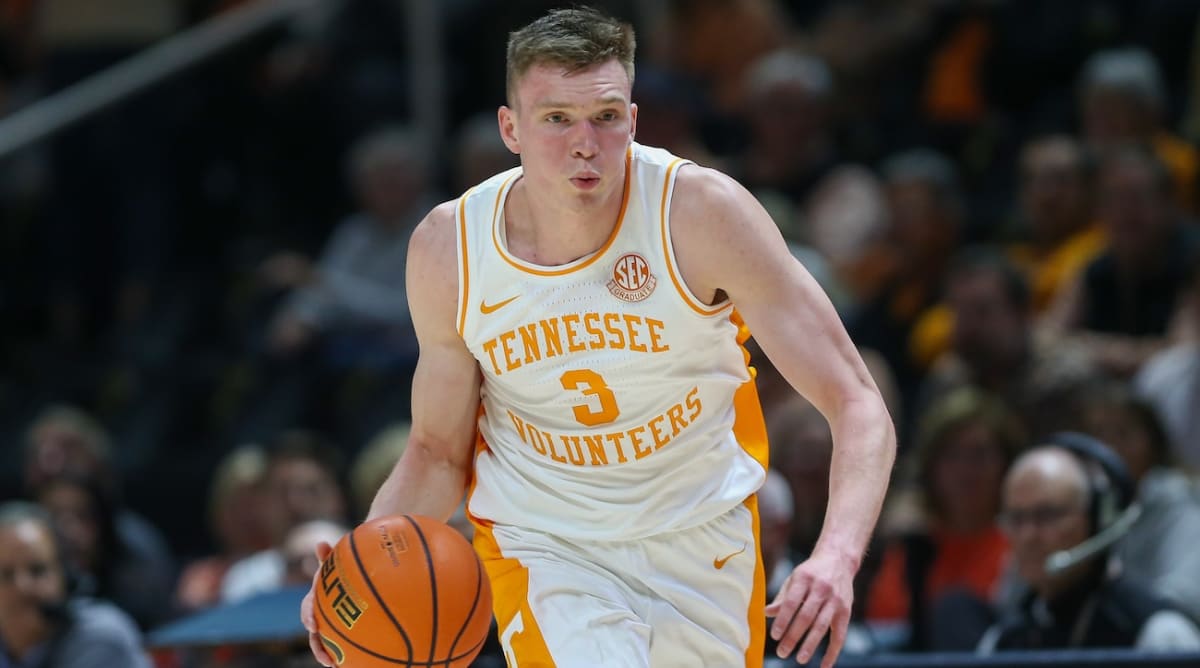“Dalton!” Rick Barnes barks suddenly in the middle of practice. “Go! GO! If you don’t want to play, go see Garrett!”
The Tennessee Volunteers men’s basketball coach is pointing toward Garrett Medenwald, his program’s director of sports performance. Medenwald immediately walks toward a VersaClimber machine located on the baseline in Pratt Pavilion, the school’s practice facility in Knoxville. Dalton Knecht—the would-be, could-be, ultimately must-be scoring savior for this Volunteers team—absorbs his chiding stoically and reports for a burst of cardio penance after a defensive lapse.
The VersaClimber is a climbing simulation machine that taxes the entire body. The Vols coach banishes players to use it for brief periods when their effort or focus fades. For Knecht, this is the first of two VersaClimber sentences during a recent two-hour practice. No other Volunteer does more than one.
Barnes was reinforcing a promise to the 6’6” wing player that he would coach him as hard as he’d ever been coached. That means calling him out for venial sins—an occasional flat-footed possession, a failure to get through a screen. That means holding him to a higher and harsher standard than some other Tennessee players. Which is fine with Knecht.

Randy Sartin/USA TODAY Sports
“I told Coach on our first Zoom meeting that I want to be coached really, really hard,” he says. “I want to be pushed every single day. I can’t thank Coach enough for that.”
This is a compact made between two men. Barnes, leader of one of the best defensive programs in college basketball, would teach Knecht how to guard. Knecht, owner of one of the most well-rounded offensive games in the sport, would supply Barnes with glaringly missing firepower. The one-year arrangement has played out like a dream so far—the Volunteers are ranked in the AP Top 10 and Knecht leads the Southeastern Conference in scoring—but the next two months are what matter most.
They needed each other—the decorated 69-year-old coach trying to make a late-career run at an elusive national championship, the talented 22-year-old mid-major transfer trying to complete an improbable rise to the NBA. They found each other. They are locked into this mission together. Knechted, if you will.
Dalton Knecht walks into a Pratt Pavilion lounge area and his coach immediately has jokes. “Look how ugly he is,” Barnes says in his North Carolina drawl, while sitting on a pair of pillows to alleviate a back ache. “Is that just a Colorado thing? Is that everybody out there?”
The product of Thornton, Colo., a Denver suburb, laughs it off. Knecht has been at Tennessee long enough to know that Barnes is a Hall of Fame needler of anyone in his orbit, a practitioner of the light-hearted putdown. In terms of basketball aesthetics, it’s been years since Barnes has seen anything as beautiful as Knecht’s jumper.
Knecht is on pace to be Tennessee’s first 20-points-per-game scorer since Barnes’s first season at the school in 2015–16, even though he’s not yet averaging 30 minutes per game. That is in the process of changing—Knecht’s minutes, usage rate and scoring have all shot up over the last six games, as SEC play has intensified. During that stretch, he averaged 31.8 points in 33.5 minutes. Hours of work this offseason to diversify his game—better straight-line drives, more post-up and midrange proficiency—has made him an all-court scorer and matchup nightmare.
In particular, Knecht has gone on some epic scoring streaks. He tallied Tennessee’s final 13 points against South Carolina on Tuesday; scored 17 out of the Vols’ 21 points in a 5½-minute stretch against Vanderbilt; scored 15 points in 10½ minutes against Alabama; racked up 20 in a 6½-minute stretch against Florida; had nine of Tennessee’s 11 as the Vols went from down four to up four in the final 4:11; and scored 19 points in fewer than 10 minutes against Mississippi State.
With Knecht as the hub, this has become Barnes’s most efficient offensive team since 2019 and his second-most efficient at Tennessee, according to analytics guru Ken Pomeroy. The Vols’ average offensive efficiency ranking in Barnes’s first eight seasons was 58th; right now, they’re exactly twice as high at No. 29.
Meanwhile, the defensive efficiency ranking remains where it has been for four straight seasons—in the top five nationally. Tennessee currently is No. 2 defensively, trailing Houston. (Also not a coincidence: Barnes and Cougars coach Kelvin Sampson are close friends.)
That would suggest the constant harping on Knecht’s defense is getting through. He’s not a weak link—certainly not one weak enough to bring down the entire barbed-wire approach. With Santiago Vescovi, Zakai Zeigler and Josiah-Jordan James mentoring him defensively and welcoming him to take over offensively, Knecht has fallen in with a group of veterans who will do what it takes to get where they’ve never been.
As was implicit in the original compact between Barnes and Knecht, he’s learning to ply his trade at both ends of the floor. It’s helped him rise in early mock NBA drafts into the first half of the first round, with some ranking him in the top 10.
It is a staggering ascension for a kid who spent his first four years of college playing in virtual anonymity. From Northeastern Junior College to Northern Colorado to Tennessee to the draft lottery, it would be a journey only one person saw coming: Dalton Knecht.
“I’ve always had the confidence to play at this level,” he says. “I felt like I’ve been underrated my entire life and always played with a chip on my shoulder, thinking I could get here. I’m just living a dream right now.”
That doesn’t mean the dream has come easily. For a kid who was 5’8” entering his sophomore year of high school, even playing college ball seemed like a long shot. And even after growing to 6’1”, poor grades sent Knecht on the juco route.
That landed him at Northeastern in Sterling, Colo., a town on the plains of eastern Colorado—or greater Kansas, as that part of the state is sometimes known. It’s far from the mountains that form Colorado’s geographic backbone and cultural center, and even further from the college basketball mainstream. But this was just a step Knecht knew he had to take to get where he wanted to go.
“I was fine with it,” he says. “I loved it there.”
Meanwhile, Knecht kept growing, adding five inches to his frame in two years at Northeastern while retaining his small-guard skills. That combination allowed him to average more than 23 points per game and earned him a scholarship at Northern Colorado, a Big Sky Conference program in Greeley.
After one season as a role player, Knecht blossomed into a star, averaging 20.2 points and 7.2 rebounds. The pros were not yet interested in him, but plenty of high-major programs were as a fifth-year transfer. Word spread about an elite scorer with NBA size, and in modern college basketball, there is less stigma attached to mid-major players looking for a bigger stage.
Around 8 a.m. one spring morning, Knecht put his name in the transfer portal. He then went to the gym to get shots up. By the time he checked his phone again, the world had changed.
“I had over 500 missed calls and 1,200 text messages,” he says. “I’m calling one coach back and there are two other coaches calling me. Same with my parents. It was wild.”

Dale Zanine/USA TODAY Sports
Many of the bluebloods called—North Carolina, Kansas, Kentucky, Indiana, etc. After phone calls and Zoom calls, Knecht settled on visits to Oregon, Tennessee and Indiana. He particularly connected with Volunteers assistant Rod Clark.
“We kind of connected off the rip—he was a junior-college guy, I was a junior-college guy,” Clark says. “I asked him what schools he liked and he said Gonzaga, Oregon, Missouri, Arkansas. I’m thinking, If you have Kansas, North Carolina, Indiana, why would you like these schools? Then I figured out, he’s not caught up by names. He might fit with us.
“So next time we got on the phone I told him, ‘We struggled on offense, we need offense. You’re one of the worst defenders in college basketball, you need defense. This could be a perfect marriage.’ He was locked in on getting better, said he just wanted to compete for a starting spot. That’s the dog in him.”
North Carolina and Kansas were in contact but playing it more deliberately, Knecht says. He took an official visit to Oregon and one to Tennessee, with a third trip to Indiana postponed by coach Mike Woodson because he had a scheduled knee surgery, according to Knecht.
The Tennessee visit was arranged quickly. Clark believed that if he got Knecht on campus and met the rest of the team, he would commit. It helped that Barnes had coached Knecht’s favorite player, the superstar he modeled his offensive moves after, Kevin Durant. Barnes played Durant video from their days at Texas for Knecht, similarities and areas where he could be more like Durant.
Shortly after the visit, Knecht shut down his recruitment and became a Vol. This was a recruiting coup, but still a quantum leap. Rod Clark, were you convinced from the start that a guy from Northern Colorado could become an instant-impact start in the SEC?
“No, if I’m being honest,” Clark says with a chuckle. “You think about it, going from the Big Sky to the top of the SEC, your numbers are going to dip. But he’s gotten better. It’s almost like he was just waiting for the opportunity.”
The old saying is that luck happens when preparedness meets opportunity. Tennessee supplied the opportunity, and Dalton Knecht has never stopped making sure he is prepared to seize it.
Ask Vols graduate assistant Riley Collins. One of his duties with the program is to be ready to shag rebounds and make passes whenever Knecht calls and wants to go to Pratt Pavilion to shoot. And those calls come often—sometimes early in the evening, sometimes closer to midnight.
“He wants to go every day,” Collins says. “Sometimes Coach Barnes tells me to shut him down, just shoot 100 free throws and go home. We’ve got to pace him.”
One recent shooting session, Collins says, Knecht made 43 out of 45 from three-point range. The shooter confirmed that number.
“Sometimes I get in a zone out there,” he says with a shrug. “These facilities? It’s crazy. I’ve been at juco, been at a mid-major. I know that not many people have this. I want to stay in this facility all day. Everything is on steroids here. This is a hooper’s dream.”
The unaccomplished part of the Volunteers’ hoop dream is portrayed on the banners in Pratt Pavilion. Or, perhaps more accurately, it’s portrayed by what isn’t on the banners. Tennessee has never been to the Final Four, and only once advanced to a regional final (in 2010). It has won just one SEC tournament since 1979 and just one regular-season title since 2008.

Saul Young/News Sentinel/USA TODAY NETWORK
Barnes fixed a damaged program when he got here, reeling off six straight winning seasons (this will be the seventh). He could deliver his sixth NCAA tournament bid at Tennessee come Selection Sunday, and this almost assuredly will be a third straight 20-win season. But the March tales of woe are lengthy.
A second-round upset loss to Loyola Chicago in 2018, on a buzzer beater that bounced around the rim before dropping. A heartbreaking overtime loss in the Sweet 16 as a No. 2 seed the next year. A first-round flameout in 2021 against Oregon State as a No. 5 seed. A second-round knockout as a No. 3 seed in ’22. A Sweet 16 loss to No. 9 seed Florida Atlantic last year. Twice, Tennessee has been victimized by a mid-major Cinderella on the way to the Final Four.
That extends a streak of underachieving for Barnes that dates to his Texas days. He reached a Final Four in 2003 and Elite Eights in ’06 and ’08—but his final six NCAA tourney teams with the Longhorns never made it out of the first weekend.
Since ’03, Barnes has coached Durant, P.J. Tucker, LaMarcus Aldridge, D.J. Augustin, Tristan Thompson, Myles Turner and other future NBA players without making another Final Four. With this current team, Barnes is optimistic but guarded about a return to the last weekend of the tournament some 21 years after the first. His history and his nature necessitate the caution.
“There’s a lot of teams at this time of year that level out,” he says. “If we’re one of those teams, that would be disappointing. We’ve got to continue to have that edge. This team, they compete. We can’t lose that.”
It would be something if a transfer from Northern Colorado, Rick Barnes and Tennessee all get to the Promised Land together. It would fulfill a compact—a Knechtion—between an old coach and a young star.














